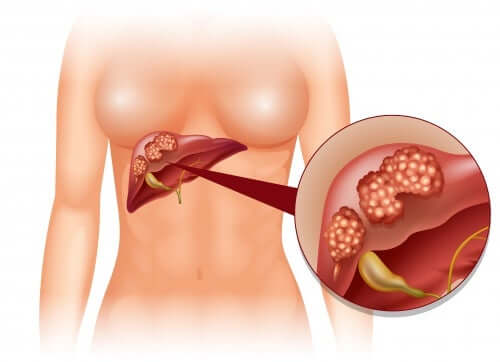Signs and Symptoms of High Estrogen Levels


Reviewed and approved by the doctor Nelton Abdon Ramos Rojas
For your body to function as it should, it needs a certain hormonal balance. In fact, many health problems can appear due to hormonal imbalance. In this article, you can discover some of the causes of high estrogen levels and the symptoms they cause.
Estrogen is a female sex hormone that’s mainly secreted by the ovaries and adrenal glands.
It’s responsible for the manifestation of secondary female sexual characteristics. In women, it causes breast development and menarche. It also regulates the menstrual system and the function of the reproductive system.
On the other hand, testosterone is the masculine hormone that’s produced by the testicles. Its main function is the development of genital glands and the maintenance of secondary male sexual characteristics.
Although each of these hormones is identified by gender, both are found in men as well as women.
You might also like to read: Estrogen: An Essential Hormone for Women
What causes high estrogen levels?
High estrogen levels could be related to accidental causes or even bad habits, such as:
- Alcohol abuse.
- Excessive consumption of fast food (although there aren’t any reliable sources regarding this claim).
- Certain medications.

- Cardiovascular diseases.
- Old age (which leads to lower testosterone).
- Obesity.
- Hypothyroidism.
- In the case of men, testicular tumors
- Exposure to phytoestrogens or xenoestrogens.
- An abnormal drop in progesterone levels.
- In the case of diabetics, insulin problems.
- Consumption of drugs that contains estrogen.
- Steroid use.
- Drug use.
- Birth control pills.
- Digestive system problems.
- Kidney problems.
- Exposure to chemical products (such as food pesticides).
- Cirrhosis.

What are the symptoms of high estrogen levels?
- Swelling.
- Breast swelling and soreness (caused by fibrocystic breast changes).
- Increased premenstrual symptoms and decreased sexual desire.
- Irregular menstrual periods.
- Headaches and difficulty remembering information.
- Mood changes.
- Weight gain.
- Hair loss.
- Tiredness or fatigue.
- Sleeping problems.
Effects of high estrogen levels in men
Sometimes, estrogen or testosterone levels can be higher than normal. When this happens, the hormonal balance that guarantees proper body functioning is lost.
Let’s take a look at the possible effects of abnormal estrogen levels in men.
Infertility problems
Estrogen is partly responsible for healthy sperm development. When there are high levels of estrogen, the number of sperm in the semen can decrease. This is one of the causes of male infertility.
If you and your partner have been trying for a baby for some time without success, you should consult your doctor. They can run some tests to see if high estrogen levels are the problem.
Gynecomastia
Estrogen stimulates the growth of breast tissue. Excessive estrogen may cause abnormal breast growth in men.
This impacts many men’s self-esteem. Fortunately, there’s the option of plastic surgery which, in fact, is becoming increasingly common.
Erectile dysfunction
The balance between testosterone and estrogen is important for human sexual development. Erectile function may be affected when there’s an imbalance. Therefore, it may be difficult for men to maintain an erection.
However, it’s worth mentioning that hormonal erectile dysfunction is uncommon.
You might also be interested to read: Do Herbal Remedies for Erectile Dysfunction Work?
How to diagnose high estrogen levels
Your doctor will likely require a blood sample to verify the estrogen levels in your body.
Once they have the results, they might prescribe drugs to help you maintain balanced levels of estrogen. In addition, they may ask you to change certain aspects of your lifestyle. This ensures a comprehensive treatment of the symptoms.
How to avoid increasing your estrogen levels
There are many ways to avoid high levels of this hormone. Changing certain lifestyle habits is important. In fact, with some really simple actions, you could be doing a lot for your health.
- Lower your alcohol consumption.
- Add more fruits and vegetables to your diet.
- Avoid fatty foods.
- Reduce stress levels (although, as yet, no studies confirm a correlation).
- Consume more fiber.
- Play a sport or exercise at least three times a week.
High estrogen levels may also increase the risk of other serious conditions, such as breast cancer. Also, exposure to high estrogen levels for extended periods can cause endometrial cancer.
Consult your doctor
If you’re experiencing unusual symptoms, it’s best to consult your doctor. This is the only way to determine the cause of your symptoms.
It’s extremely important to treat estrogen imbalances in time. However, before treatment, doctors must determine its causes.
Remember that any condition, no matter how serious it is, has a solution if it’s treated in time. Above all, the best course of action to prevent most illnesses is by leading a healthy lifestyle.
All cited sources were thoroughly reviewed by our team to ensure their quality, reliability, currency, and validity. The bibliography of this article was considered reliable and of academic or scientific accuracy.
- Aguilar Cordero, M., González Jiménez, E., García López, P., Álvarez Ferre, J., & Padilla López, C. A. Obesidad y niveles séricos de estrógenos: importancia en el desarrollo precoz del cáncer de mama. Nutrición Hospitalaria. 2012; 27(4): 1156-1159.
-
Delgado BJ, Lopez-Ojeda W. Estrogen. In: StatPearls [Internet]. Treasure Island (FL): StatPearls Publishing; 2022 Jan.
-
Domínguez-López I, Yago-Aragón M, Salas-Huetos A, Tresserra-Rimbau A, Hurtado-Barroso S. Effects of Dietary Phytoestrogens on Hormones throughout a Human Lifespan: A Review. Nutrients. 2020 Aug 15;12(8):2456.
-
Erol A, Ho AM, Winham SJ, Karpyak VM. Sex hormones in alcohol consumption: a systematic review of evidence. Addict Biol. 2019 Mar;24(2):157-169.
- Hur J, Cho EH, Baek KH, Lee KJ. Prediction of Gestational Diabetes Mellitus by Unconjugated Estriol Levels in Maternal Serum. Int J Med Sci. 2017 Feb 7;14(2):123-127.
- Jabaloyas, J. M. Hormonal etiology in erectile dysfunction. Archivos Españoles de Urología. 2010; 63(8): 621-627.
- Majlis, S. (2008). HORMONAS FEMENINAS Y CÁNCER DE MAMA: ESTADO DE LA POLÉMICA Y EVIDENCIAS. ¿ QUE RESPONDER A LAS PACIENTES?. Revista chilena de radiología. 2008; 14(3): 113-121.
- Qi X, Yun C, Pang Y, Qiao J. The impact of the gut microbiota on the reproductive and metabolic endocrine system. Gut Microbes. 2021 Jan-Dec;13(1):1-21.
- Ramírez-Sánchez, I. M., Martínez-Austria, P., Quiroz-Alfaro, M. A., & Bandala, E. R. Effects of Estrogens, as Emerging Pollutants, on Health and the Environment. Tecnología y ciencias del agua. 2015; 6(5): 31-42.
-
Rochira V, Madeo B, Diazzi C, et al. Estrogens and male reproduction. In: Feingold KR, Anawalt B, Boyce A, et al., editors. Endotext [Internet]. South Dartmouth (MA): MDText.com, Inc.; 2000.Spratt DI, Morton JR, Kramer RS, Mayo SW, Longcope C, Vary CP. Increases in serum estrogen levels during major illness are caused by increased peripheral aromatization. Am J Physiol Endocrinol Metab. 2006 Sep;291(3):E631-8.
This text is provided for informational purposes only and does not replace consultation with a professional. If in doubt, consult your specialist.








